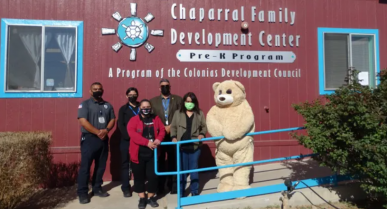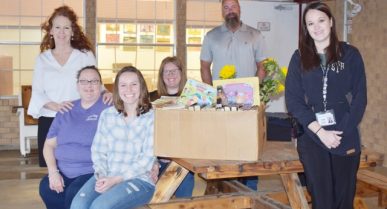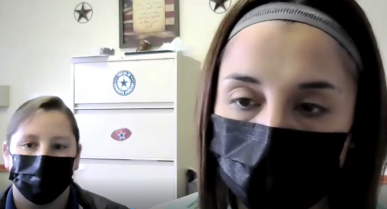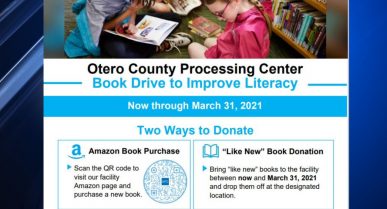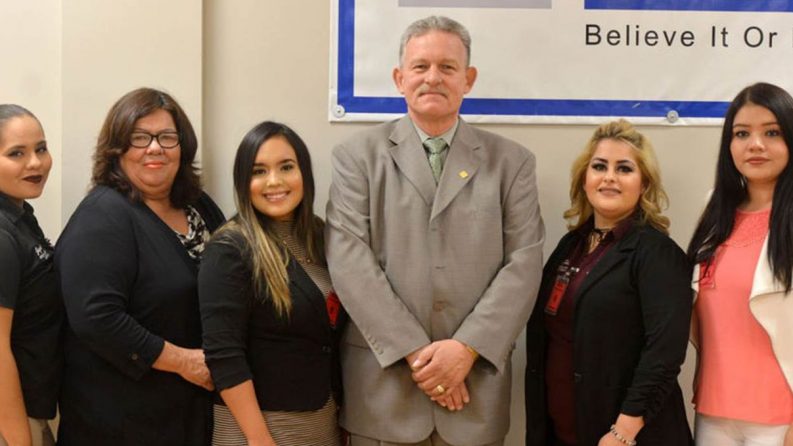
NEWS: Advocacy group partners with detention facility

27 Aug 2017
BY EDWIN DELGA Staff Writer
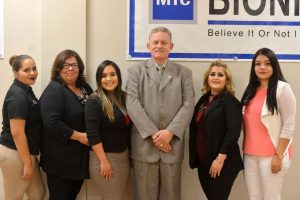 EDWIN DELGADO PHOTOImperial Regional Detentional Facility warden John Rathman (center) joined by Sure Helpline staff (from left) Jasmine Bueno; Consuelo Siqueiros; Brandy Galvan; Kenia Felix and Johana Ramirez.
EDWIN DELGADO PHOTOImperial Regional Detentional Facility warden John Rathman (center) joined by Sure Helpline staff (from left) Jasmine Bueno; Consuelo Siqueiros; Brandy Galvan; Kenia Felix and Johana Ramirez.
CALEXICO — Being in detention is a hardship, even a more distressing experience for immigrants seeking to escape from the troubles at home or who are seeking a better future.
At the Imperial Regional Detention Facility located east of Calexico, what began as a partnership to meet federal standards has become a close knit partnership which has enhanced the experience of those who go through this facility.
The Prison Rape Elimination Act adopted in 2003 is a federal effort to monitor sexual assault incidents and take preventive measures against assaults in detention facilities. To comply with the law, the Management & Training Corporation who runs the facility in Calexico joined forces with the local advocacy group Sure Helpline Crisis Center to aid in that effort two and a half years ago. Once Sure Helpline began to work with the detainees, Warden John Rathman soon realized the wide array of programs the group offered and how those could allow the individuals in the facility to better cope with detention.
Even though detainees usually stay for short periods of time in the facility as their immigration cases get resolved, Rathman said the variety of programs and presentations offered by Sure Helpline Crisis Center have made a noticeable difference, which
is the reason the center has recently decided to come into the facility an extra day, now making three visits per week.
Brandy Galvan, an advocate for the center, said that some of the services they offer include awareness regarding sexual assault, domestic violence, suicide prevention and others.
“We’re here to provide a service and offer support so they don’t feel alone,” said Margaret Sauza, executive director of Sure Helpline Crisis Center. “We’re very grateful to the warden for opening the doors to us, we have a great partnership.”
Johana Ramirez, a lead advocate who works with the detainees, said that although the main information shared with the people in detention deals with sexual assault and domestic violence, they also have support groups in which the detainees share some of their hardships and what circumstances prompted them to leave their home to get to the United States. Breaking the silence allows the center’s advocates to get a better understanding of a detainee’s unique circumstance and provide better services to them.
“It’s always very good to have them open up about these topics,” Ramirez said. “We’ve seen how much it means to them, which makes our job feel much more gratifying.”
Kenia Felix, coordinator for Sure Helpline, said the openness of the detainees they work with changes dramatically in a short amount of time which allows them to create a very positive environment that makes them feel society has not forgotten about them.
All of the work and all of the different programs have raised the morale of the immigrants in the facility, which has also helped in boosting their participation in other programs offered in the facility such as English as a second language courses, GED courses and vocational programs.
“Very positive it’s a morale builder. It makes the atmosphere [in the facility] as positive as it can be while being in detention,” Rathman said.
Galvan said their programs have become so popular among the detainees that even the immigrants housed in the facility who don’t speak English or Spanish take part in their programs.
Many of the detainees at the end of their immigration cases will be deported back to their native countries. The advocacy group also focuses on helping them adjust to their lives after detention.
Ramirez said one of her favorite activities to do with the detainees is to get them to think about their future and help them envision and draw what they’d like to see themselves do after they get released.
“It’s a beautiful thing,” she said. “We bring something different and try to really connect with them to allow them to open up.”
In Rathman’s eyes, Sure Helpline has gone above and beyond to make the experience of the detainees a bit easier and hopes to continue to be a close partner of the center. For Sauza, the work is never done, as she sees the enthusiasm of the people who gather for their classes and programs, she envisions that sometime in the future they’ll get enough resources to visit the facility every day.
“I have a wonderful team that has the passion and dedication to help, the passion for the job is what sets them apart and makes them take their jobs more seriously, and it shows,” Sauza said.

